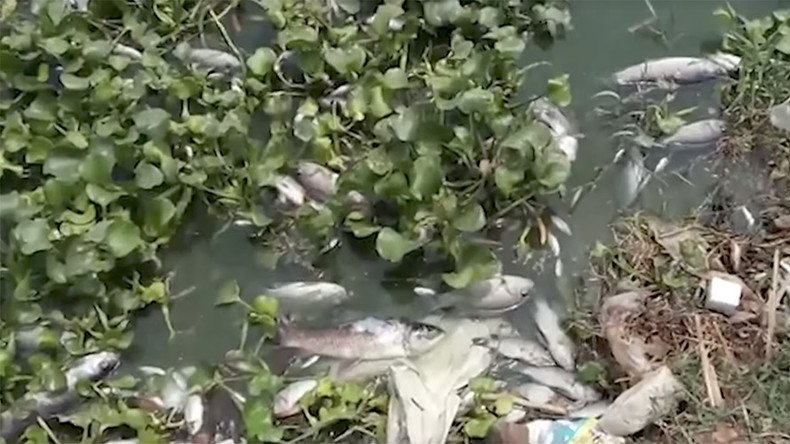Mystery surrounds death of 30,000 fish at Indian lake (VIDEO)

More than 30,000 dead fish washing up on the shores of Rampally lake near Hyderabad in central India prompted an angry response from environmental activists, who claim it shows the area’s alarming pollution levels.
The mass death follows similar incidents last week in which a total of 60,000 fish were found dead in the waters of Shamirpet lake and Medchal lake on the outskirts of the city.
Local officials claim the fish succumbed to a bacterial infection caused by high temperatures – but environmental activists insist responsibility lies with domestic and industrial polluters.
Speaking to the Times of India, environmental expert Prof K Purushotham Reddy said: “Lakes and [water] tanks around city are becoming a deadly mix of domestic sewage, municipal waste and hazardous waste dumped irresponsibly by industries. When it rains, all this flows into lakes and tanks."
“Since these wastes contain all kinds of acids, plastics and chemicals, the subsequent reactions reduce the level of dissolved oxygen in water which makes it impossible for fish to survive.”
Rampaging elephant chases down tourists in Indian national park https://t.co/yyTHmIaLfNpic.twitter.com/1hpklHzQAT
— RT (@RT_com) May 29, 2017
Members of a local fishermen’s cooperative refuse to place the blame squarely on industrial chemical plants surrounding the lake. They point to the area’s increasing urbanization as well as the fact that Rampally is at the apex of three interconnected lakes which are all similarly polluted.
"It's not just pollution from industries in the close vicinity but also increasing number of residential colonies release their waste into the lake,” said Laxman Eega, a local fisherman.
#India to build 10 reactors in big #nuclear power push https://t.co/ihEnjI8NSwpic.twitter.com/WH42SfWNfK
— RT (@RT_com) May 19, 2017
Meanwhile, Prof Reddy has warned that the surviving fish might now be too dangerous to consume. “What is dangerous for the fish is dangerous for us too, especially if the fish is from polluted lakes,” he said.
Activists group Save Our Urban Lakes (SOUL) have blamed the local government for its failure to regulate industry.
Speaking following the mass death on Shamirpet lake last week, SOUL spokesperson Lubna Sarwath said: “The government continues to be in denial regarding the condition of the dying lakes. They are converting the lakes into dumping grounds for mud and sewage.”
READ MORE: India’s army chief defends soldier who used man as human shield against stone-throwers
The latest series of incidents follow another in February when three industrial units were ordered to stop operations following the discovery of thousands of dead fish in Isnapur lake. During the subsequent investigation, the Telangana State Pollution Control Board (TSPCB) found a high level of chemical effluent was being released into the 200-acre site.












